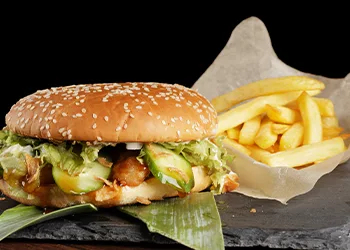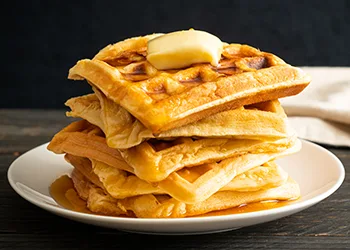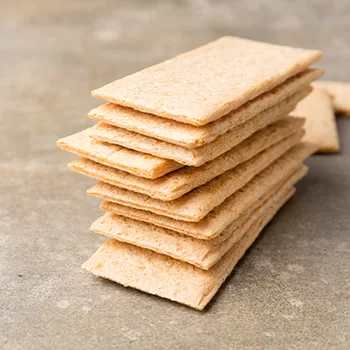Studies have shown that diets high in trans fatty acids can lead to significant illnesses like cardiovascular disease, breast cancer, colon cancer, diabetes, and obesity.
They may also lead to an increase in LDL (bad cholesterol) and a decrease in high-density lipoprotein (good cholesterol), skewing the lipid balance in your body.
After many hours of going through recent studies and researching the ins and outs of trans fats, I’ve compiled some useful information, as well as a list of food items that you should avoid to reduce trans fat consumption.
One of the more convenient and healthier ways is opting for some of the best paleo meal delivery services.
Let's take a look.
Quick Summary
- Common sources of trans fats include processed meats, fried foods, vegetable oils, cakes, pies, and microwave popcorn.
- To reduce the risk of health issues like cardiovascular disease and diabetes, it's crucial to avoid foods high in trans fats.
- The World Health Organization recommends consuming less than 4% trans fats in your total calorie intake per day.
- In my opinion, making informed dietary choices and opting for healthier alternatives like air-popped popcorn and homemade treats can significantly improve overall health and well-being.
12 Popular Foods That Contain Trans Fat

One of the more convenient and healthier ways is opting for some of the best paleo meal delivery services.I’ve gathered the list of the top 12 trans-fat-rich food items you should avoid:
1. Processed meat
Most trans fats, unlike the rare natural ones, are artificial and found in processed foods like sausages and hot dogs.
If you're a fan of processed meats but want to dodge these bad fats, try options like fish rich in omega-3s, lean meat, chicken, or turkey.
Artificial trans fats, made by adding hydrogen to vegetable oils, turn them solid and are a threat to heart health.
Knowing the difference between natural and artificial trans fats is key. Opt for healthier choices to cut down on harmful trans fats and boost your diet's balance and nutrition.
2. Vegetable Shortening
Vegetable shortening is mostly vegetable fat that has been hydrogenated and therefore solidifies at room temperature. It’s mainly used to make pastries, and some people use it as a substitute for lard and butter.
Companies can also write 0 grams of trans fats if their products have less than 0.5 grams of trans fats per serving. But if you're consuming a lot of pastry, those values will quickly reach unhealthy levels.
3. Fast and Fried Foods

I always caution my clients about on-the-go foods like fried chicken, battered fish, french fries, hamburgers, and fried noodles, which often contain trans fats.
This happens because the vegetable oils and trans fats used in frying can seep into the food.
Keep in mind, vegetable fat breaks down at high cooking temperatures, particularly when it's reused multiple times.
4. Vegetable Oils and Margarine
Some kinds of margarine contain up to two grams of trans fats per teaspoonful, while some vegetable oils contain up to 0.4% to 4.2% of trans fats if they're hydrogenated.
“A lot of people had made their careers telling people to eat margarine instead of butter, and unfortunately, we were often sending them to their graves prematurely.”
- Walter Willett, Chairman of the Department of Nutrition at the Harvard School of Public Health
Trans fat-free oils aren’t hydrogenated. You can use healthier alternative oils such as virgin olive oil or coconut oil for cooking or using butter instead of margarine.
5. Cakes and Pies
I often point out that just like vegetable shortening, cakes and pies might show 0 grams of trans fats on their labels if they contain less than 0.5 g per serving.
However, sticking to just one serving is challenging, and eating multiple servings can accumulate trans fats, risking arterial blockage over time.
To safeguard your heart, it's crucial to monitor your diet and limit cakes or pies, which often have hidden trans fats.
For optimal heart health, I recommend skipping processed sweets and opting for homemade treats made with healthy oils.
6. Non-Dairy Coffee Creamers

Coffee whiteners are used to substitute milk and cream in your beverages.
Their ingredients are sugar and partially hydrogenated vegetable oil.
If you find partially hydrogenated oil in your coffee creamer ingredients, then it most probably contains trans fats. You can use whole milk, cream, or low-fat dairy products without partially hydrogenated oils.
7. Microwave popcorn
I always tell my clients about healthier snack options. Air-popped popcorn is a fantastic choice because it's full of fiber and vitamins.
However, be cautious with microwaved popcorn, as it often contains partially hydrogenated oil, which isn't great for your health.
If you're a fan of microwaved popcorn, look for brands that don't use hydrogenated oil. But honestly, I highly recommend making your popcorn on the stovetop or using an air popper for a healthier treat.
8. Frozen Dinners
Frozen ready-to-eat foods like pizzas are high in carbs, sugar, and salt. They contain up to 1 gram of trans fats per serving, but remember, you can consume a lot of servings without realizing just how much you ate.
In addition to artificial trans fat, frozen dinners are high in sodium, with the worst meals containing up to 700 grams per serving.
9. Pancakes and Waffles

Pancakes and waffles often contain 2 grams of trans fats per serving.
They're made with refined flour and high amounts of sugar.
They can contribute to insulin resistance and increase the risk of obesity and other diseases like type 2 diabetes.
10. Ice Cream
Certain flavors of ice cream frozen desserts contain less than 0.5 grams of trans fat per serving, but some of them can contain much more.
If you see partially hydrogenated oil in the product's ingredients, that ice cream has trans fats.
11. Meat and Dairy
According to NIH, meat and dairy products contain trans fats that occur naturally [1]. Although scientists are yet to find out whether natural trans fats are as harmful as artificial ones, many still believe that consuming meat and dairy low in trans fat is a good idea.
The World Health Organization recommends consuming less than 4% trans fats in your total calorie intake per day. So avoid things like processed cheeses which can contain up to 10% of trans fat [2].
12. Biscuits and Crackers

Food processors often add trans fats to biscuits for that familiar crunch and to extend shelf life.
When baking biscuits at home, opt for healthy fats and less or alternative sugars.
If you're buying pre-made biscuits and crackers, always check the nutrition label for trans fat ingredients.
Related Articles:
How To Reduce Trans Fat in Your Diet?
There are several ways to reduce trans fat in your diet, and doing so means potentially avoiding excessive weight gain and reducing the risks of several diseases. Here are some things you can do:
- Read product ingredients and avoid foods with partially hydrogenated oils.
- Avoid commercially baked and processed foods like pies, donuts, snack foods, and fast food.
- Use healthier oils such as olive and coconut, or use butter instead of margarine.
- Avoid trans fat from fried foods.
How Does Trans Fat Harm You?

Trans fat can harm you by contributing to a range of health issues, with cardiovascular disease at the center.
It's also important to note that, unlike from other types of fat, your body doesn't benefit from trans fats at all.
Doctors worry about them because they increase the risk of heart attack, stroke, and type 2 diabetes.
Also, a recent study from the National Institute of Health (NIH) has shown that trans fats are transferred to the fetus during pregnancy, and they are usually at the same level as that of the mother [3].
This means that a child might suffer from similar health problems in the future.
Trans Fats in Dietary Supplements
As a fitness trainer, I always remind my clients to watch out for trans fats in dietary supplements. It's easy to miss them when you're focused on health goals.
Remember, even supplements can have trans fats, which might counteract your efforts to stay healthy.
I advise choosing supplements that clearly state they're "trans fat-free." It's a simple step towards ensuring your supplements support your fitness journey.
Always check for partially hydrogenated oils in the ingredient list - they're a sneaky source of trans fats. Instead, go for supplements high in omega-3s, which are great for heart health and free from trans fat worries.
FAQs
Are There Naturally Occurring Trans Fat?
Yes. Some trans fats occur naturally in the gut of some animals. You can also find natural trans fat in animal products such as meat and milk.
How Much Trans Fat Can I Eat a Day?
There's no safe amount of trans fat. However, since it's difficult to avoid them, the American Heart Association recommends that at most 1% of your daily calory intake comes from trans fats.
Which Oils Don’t Have Trans Fat?
Top liquid vegetable oils low in trans fats include olive oil, avocado oil, cottonseed oil, peanut oil, coconut oil, and soybean oil.
References:
- https://www.ncbi.nlm.nih.gov/pmc/articles/PMC2596737/
- https://www.hsph.harvard.edu/nutritionsource/2023/07/17/who-updated-guidelines-healthy-diets-total-fat/
- https://www.ncbi.nlm.nih.gov/pmc/articles/PMC3551118/
About The Author
You May Also Like






